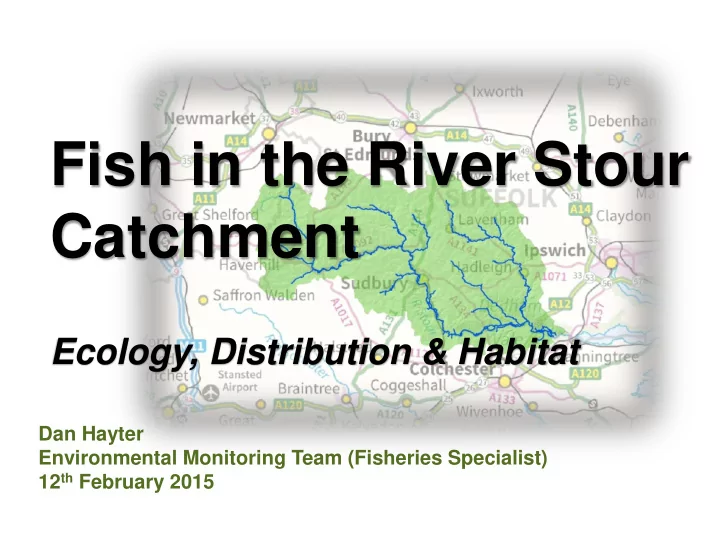

Fish in the River Stour Catchment Ecology, Distribution & Habitat Dan Hayter Environmental Monitoring Team (Fisheries Specialist) 12 th February 2015
Environment Agency – Fisheries Monitoring teams • Data collection from electro-fishing surveys • Reports for external & internal customers Fisheries, Biodiversity & Geomorphology team • Fishery management • Fishery/environmental improvements • Consenting/advice etc Enforcement team • Crime reduction(poaching etc)/licence checks 2
Why Monitor Fish? National & International drivers & commitments Environment Agency has a duty to maintain and improve fisheries Fisheries monitoring is vital to help us deliver our objectives 3
4
5
6
Current and Historic Monitoring Sites Legend Current Monitoring Sites Historic Monitoring Sites 7
What does fish data tell us? Status (health) of river ecosystem Is the water quality & quantity ok? Is there enough good quality habitat? Evidence...what is wrong and where? Stock levels, trends, population dynamics etc Info for anglers 8
Density of fish species (>99mm) on the Middle Stour 12 10 Density (Ind./100m 2 ) 8 6 4 2 0 1985 1988 1991 1994 1997 2000 2003 2006 2009 2012 Mean Chub Dace Eels Perch Pike Roach Standing crop of fish species (>99mm) on the Middle Stour 900 800 700 Standing crop (g/100m 2 ) 600 500 400 300 200 100 0 1985 1988 1991 1994 1997 2000 2003 2006 2009 2012 Mean Chub Dace Eels Perch Pike Roach 9
Fish scales used to age fish Replacement scale Original scale 10
Fish Ageing – Length Frequency Graph Chub Middle Stour 2012 20 13 4 5 6 7 3 18 2 16 14 Number of fish 12 10 8 6 4 2 0 25 40 55 70 85 100 115 130 145 160 175 190 205 220 235 250 265 280 295 310 325 340 355 370 385 400 415 430 445 460 475 490 505 520 Fish Length (mm) Roach Middle Stour 2012 600 5 6 7 8 9 10 4 1 2 3 500 400 Number of fish 300 200 100 0 20 30 40 50 60 70 80 90 100 110 120 130 140 150 160 170 180 190 200 210 220 230 240 250 260 Fish Length (mm) 11
Angling in England & Wales Around 1 million anglers were licensed in 2005 Approx £25 million funding to Environment Agency These anglers spent £1.16 billion on fishing in 2005 Important to the rural economy Help protect the environment 12
What fish live in the catchment? 14
Roach, Rutilus rutilus Common & versatile species, dominates in slow, deep reaches Spawns in vegetation in shallow water Overwinters in shoals in deep, slow flowing water Fry refuge areas important during spate Diet – anything small enough! • Insects & larvea, • Crustaceans & snails • Vegetable matter Max size 35cm+ & reach 12+ years old 15
Chub, Leuciscus cephalus Widespread & versatile, common in faster reaches Spawns in shallow water mainly on gravels Diet – insects & larvae, crustaceans & fish Max size 55cm+ & over 15 years old 16
Dace, Leuciscus leuciscus Widespread but prefers shallower, faster flowing water Spawns in shallow water on gravel riffles Warm water impacts on egg survival Diet - insects & larvae, crustaceans and drifting food Max size 25cm+ & over 7 years old 17
Brown Trout, Salmo trutta Common on some tributaries and headwaters but rare in middle and lower reaches • Prefers fast flow and requires cool, clean water Spawns in clean gravels (build redds) Diet - insects & larvae, crustaceans and drifting food Size commonly up to 35+cm but can grow much larger 18
Eel, Anguilla anguilla Endangered (95% decline in elvers since 80’s) Still widespread in lower reaches but in small numbers Barriers and loss of habitat big factors in decline Versatile, but favours woody debris, thick vegetation and often buried in sediment 19
Problems for fish Barriers to migration Channel modifications • Loss of habitat and lack of flow variation Land management • Sediment run off Pollution Warm water 20
Improvements Fish & eel passage » Barrier removal and fish pass installation » Benefits all fish species Sustainable abstraction Catchment Sensitive Farming » Benefit all species Improve channel diversity » Channel narrowing & gravel areas 21
Improvements cont Woody debris & brushwood structures » Cover and promotes natural processes to benefit all species Off-channel refuge/backwater creation » Important for fry during spate conditions Tree planting & shading » Benefit all species 22
23
Recommend
More recommend